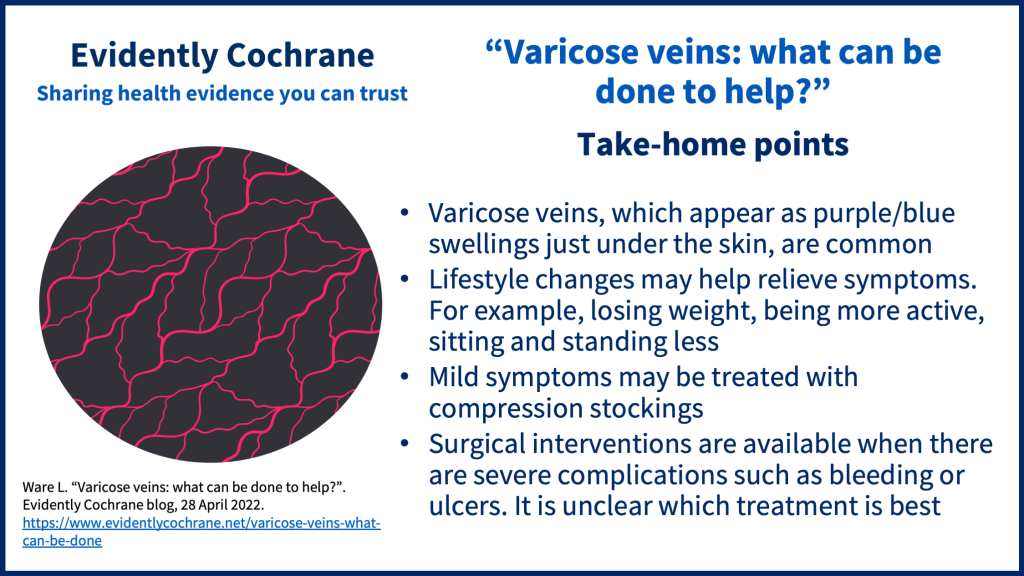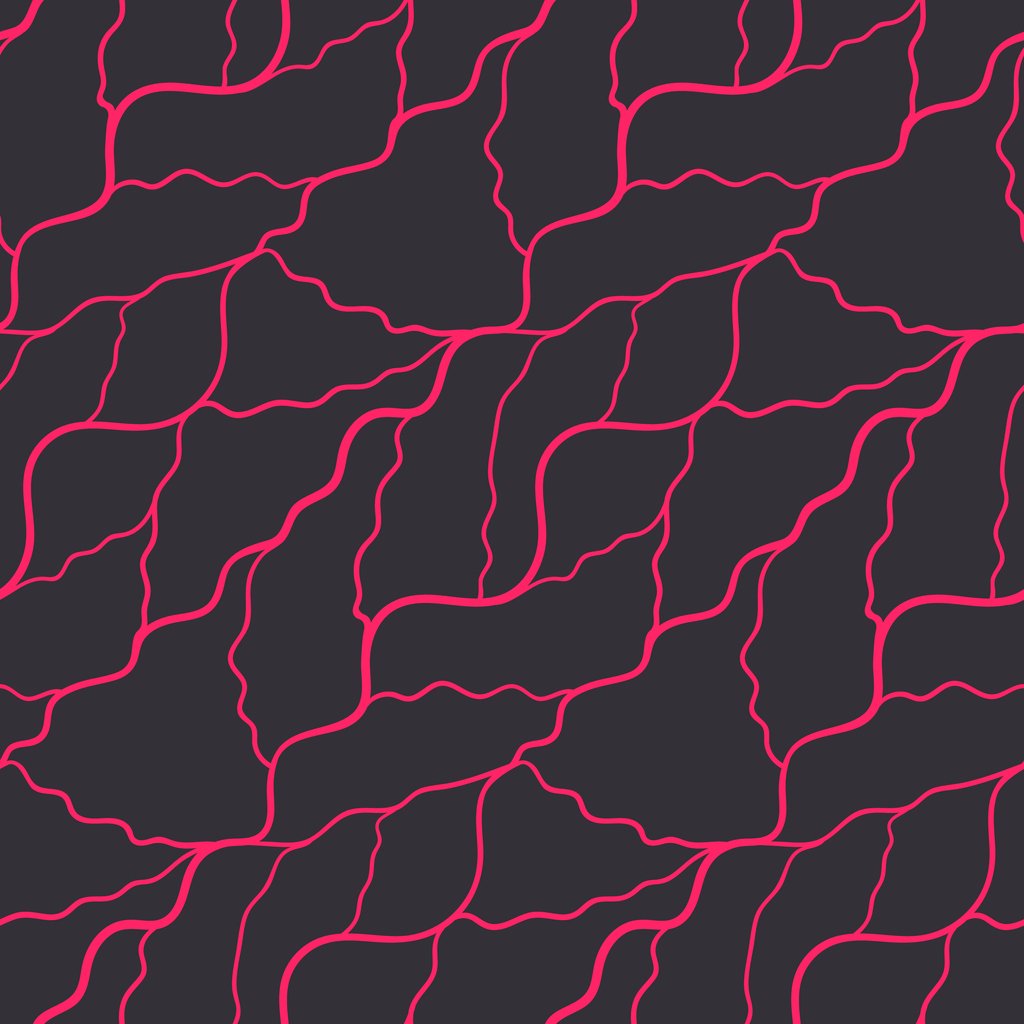Lynda Ware, a Senior Fellow in General Practice at Cochrane UK, looks at the latest Cochrane evidenceCochrane Reviews are systematic reviews. In systematic reviews we search for and summarize studies that answer a specific research question (e.g. is paracetamol effective and safe for treating back pain?). The studies are identified, assessed, and summarized by using a systematic and predefined approach. They inform recommendations for healthcare and research. on the treatmentSomething done with the aim of improving health or relieving suffering. For example, medicines, surgery, psychological and physical therapies, diet and exercise changes. of varicose veins.
Blog last updated 23 January 2023 to include recent evidence on balneotherapy (water-based therapy).
Take home points

Varicose veins are common and at least 1 in 3 of us will develop them. They can occur at several sites in the body but are commonest in the legs and these are what this blog will focus on.
Varicose veins appear as purplish/blue knobbly swellings just under the skin. Normally, blood flows from the veins on the outside of the legs to the deep veins and then back to the heart. The direction of flow is regulated by one-way valves, which, if damaged or weakened, allow blood to pool in the thin-walled superficial veins which swell and form varicose veins (or ‘varicosities’). The term venous insufficiency refers to this condition, where blood does not flow back properly to the heart.
Certain conditions put us at greater riskA way of expressing the chance of an event taking place, expressed as the number of events divided by the total number of observations or people. It can be stated as ‘the chance of falling were one in four’ (1/4 = 25%). This measure is good no matter the incidence of events i.e. common or infrequent. of developing varicose veins. For example:
- Being older
- Being female
- Having a family history of varicose veins
- Pregnancy
- Obesity
- Prolonged sitting or standing
- A history of deep vein thrombosis (a blood clot in a vein)
Varicose veins are unsightly and can cause embarrassment and distress because of their appearance. People may also complain of muscle aching and cramps; burning and itching of the overlying skin; swollen feet and ankles. Sometimes there are more serious complications such as bleeding, skin ulceration, superficial and deep vein thrombosis.
What can be done to help?
Prevention
Unfortunately, there isn’t much we can do to stop varicose veins from developing or from getting worse. Keeping active and maintaining a healthy weight are sensible lifestyle choices.
Symptomatic relief
Regular exercise helps improve circulation. It is important to avoid sitting or standing for long periods of time since this will make symptoms worse. Raising your legs on a pillow when resting can bring relief.
Compression hosiery is often prescribed. This can be in the form of knee-length socks, stockings, or tights, which compress the lower limbs in a graduated fashion to encourage the flow of venous blood away from the outside of the legs and back to the heart.
Surgical treatments
Where symptoms are life-affecting or where there are serious complications such as recurrent or persistent leg ulceration, a surgical procedure may be recommended. The commonest treatments are:
- Endothermal ablation in which the affected veins are sealed using energy from high-frequency radio waves or lasers
- Ultrasound-guided foam sclerotherapy to seal off the affected veins
- Ligation and stripping where affected veins are removed surgically
What does Cochrane evidence tell us about treating varicose veins?
A number of reviews have been published in the Cochrane Library looking at the treatment of varicose veins.
How effective and safe are compression stockings for treating varicose veins?
This is what the Cochrane ReviewCochrane Reviews are systematic reviews. In systematic reviews we search for and summarize studies that answer a specific research question (e.g. is paracetamol effective and safe for treating back pain?). The studies are identified, assessed, and summarized by using a systematic and predefined approach. They inform recommendations for healthcare and research. Graduated compression stockings for the initial treatment of varicose veins in people without venous ulceration (July 2021) hoped to find out.
Thirteen studies were included in this review, with 1021 people, all of whom had varicose veins but no active skin ulceration. Disappointingly, there was insufficient evidence to be able to draw firm conclusions on how effective and safe compression stockings are since many of the studies looked at different outcomesOutcomes are measures of health (for example quality of life, pain, blood sugar levels) that can be used to assess the effectiveness and safety of a treatment or other intervention (for example a drug, surgery, or exercise). In research, the outcomes considered most important are ‘primary outcomes’ and those considered less important are ‘secondary outcomes’. and used different ways to assess and report them. Further well-designed trialsClinical trials are research studies involving people who use healthcare services. They often compare a new or different treatment with the best treatment currently available. This is to test whether the new or different treatment is safe, effective and any better than what is currently used. No matter how promising a new treatment may appear during tests in a laboratory, it must go through clinical trials before its benefits and risks can really be known. are needed to help answer this question.
Which treatments for varicose veins are the most effective?
The Cochrane Review Interventions for great saphenous vein incompetence (August 2021) looked at this.
The authors found dataData is the information collected through research. on well-established procedures such as radiofrequency and laser ablation, foam sclerotherapy and surgery. They also included findings from studies looking at newer treatments such as cyanoacrylate glue, mechanochemical ablation and endovenous steam ablation.
There are relatively few studies and the evidence remains uncertain as to which procedure is best. However, it appears that all currently available treatments may be similar in terms of how well they destroy the veins and stop blood pooling in the legs.
Surgical treatments for varicose veins
The review Surgery for deep venous insufficiency (September 2021) looked at studies investigating surgical treatments of deep venous insufficiency. The authors found only four small studies, all of which considered surgical repair of venous valves (valvuloplasty). The evidence was of low- or very low-certainty and no firm conclusions could be drawn on the effectivenessThe ability of an intervention (for example a drug, surgery, or exercise) to produce a desired effect, such as reduce symptoms. and safetyRefers to serious adverse effects, such as those that threaten life, require or prolong hospitalization, result in permanent disability, or cause birth defects. of the procedure.
Another review, CHIVA method for the treatment of chronic venous insufficiency (September 2021) looked at a specific minimally-invasive surgical technique for treating varicose veins. There were six studies included in the review, with 1160 people. CHIVA was compared to vein stripping, compression stockings, radiofrequency ablation and endovenous laser therapy. The certainty of the evidenceThe certainty (or quality) of evidence is the extent to which we can be confident that what the research tells us about a particular treatment effect is likely to be accurate. Concerns about factors such as bias can reduce the certainty of the evidence. Evidence may be of high certainty; moderate certainty; low certainty or very-low certainty. Cochrane has adopted the GRADE approach (Grading of Recommendations Assessment, Development and Evaluation) for assessing certainty (or quality) of evidence. Find out more here: https://training.cochrane.org/grade-approach was low or very low and further studies are needed before firm conclusions can be drawn.
The updated review Injection sclerotherapy for varicose veins (December 2021) looked at the effectiveness and safety of sclerotherapy. There were 28 studies included in the review, involving 4278 participants. The authors concluded that low to very low certainty evidence indicates that sclerotherapy may be effective but that rates of deep vein thrombosis may be slightly increased. It is uncertain whether any particular foam or technique is superior to any other.
Water-based therapy
Another review, Balneotherapy for chronic venous insufficiency (January 2023), looked at the effectiveness of balneotherapy; a water-based therapy that is usually practiced in spas. Balneotherapy involves people immersing themselves in thermal or mineral water or mud loaded with minerals. Sometimes, it may also include exercises. The review included 9 studies with 1126 people. Compared to no treatment, balneotherapy probably results in slightly reduced disease severity, and may reduce pain and skin colour changes. Water-based therapy may also improve quality of life but the evidence is very uncertain. There may be little or no difference in side effects. Evidence comparing balneotherapy with other treatment options is very limited.
You can find further information about treating varicose veins on the NHS website.
Join in the conversation on Twitter with @CochraneUK and @CochraneVasc or leave a comment on the blog.
Please note, we cannot give specific medical advice and do not publish comments that link to individual pages requesting donations or to commercial sites, or appear to endorse commercial products. We welcome diverse views and encourage discussion but we ask that comments are respectful and reserve the right to not publish any we consider offensive. Cochrane UK does not fact check – or endorse – readers’ comments, including any treatments mentioned.
Lynda Ware has nothing to disclose.



My sister’s varicose veins became more prominent during the time she was pregnant, and now that she is done giving birth, she plans to have them removed soon since they look unsightly and cause her to feel muscle aches sometimes. I appreciate you letting us know that ligation can be done if we continue to encounter serious complications with the varicose veins since this involves removing the affected veins surgically. I’ll take note of this and help my sister see a general surgeon in Phoenix soon in case her veins need this treatment.
My job as a saleslady at a clothing store requires me to stand for long hours with high heels on, so it’s not surprising that I developed varicose veins on my legs because of this. Thank you for letting us know that there are surgical treatments available for varicose veins if the symptoms start to become life-affecting and lead to serious complications. I’ll keep this in mind while I look for a vein doctor to consult with soon.
Such a great blog! Thank you for this information, I appreciate your effort, please keep us update.